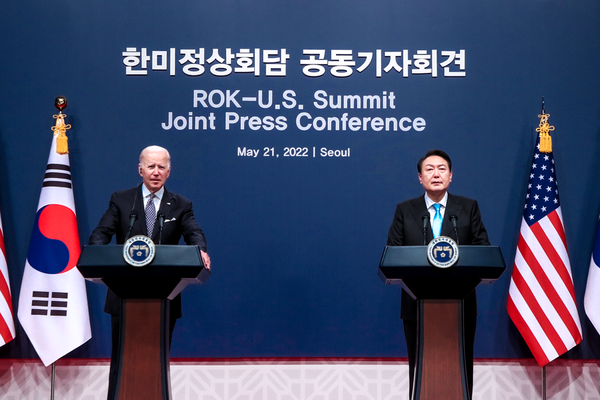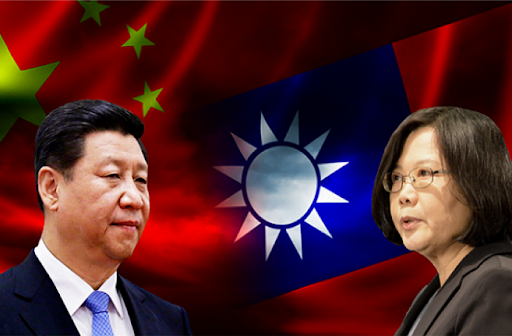
Last March, the British Weekly pointed out that “...Asia risks something even worse: conflict between America and China over Taiwan'' in the article “How to avoid war over Taiwan.” South Korea, in particular, is geographically in the most dangerous position. In addition, a new Cold War between the United States and China is unfolding, and the alliance between the Democratic People’s Republic of Korea (DPRK), China, and Russia is strengthening. DPRK is continuing their development of tactical nuclear weapons and has been conducting live-fire drill stimulating attacks on S. Korea recently. As such, S. Korea's security situation is at its most serious level since the Korean War in 1950. The whole world is drawing up a contingency plan for the Taiwan issue. However, preparations for countermeasures in S. Korea are still insufficient.
1. China-Taiwan Relations, DPRK’s Nuclear Provocation, and Unstable Security Environment of South Korea
A report released on January 9th by the Center For Strategic and International Studies (CSIS), an American think tank analyzing global issues, presented the results of 24 simulations of China's invasion on Taiwan. Regarding Korea, it was stated that “The project assumed that because of the pressing nature of the conflict with China, the United States would release two of its four squadrons in South Korea.” If China invades Taiwan, the US can mobilize US forces in Korea regardless of S. Korea's will. If U.S. forces in S. Korea are committed to the Taiwanese war, China is highly likely to retaliate. Not only China, but also the DPRK will attack S. Korea because the Sino-North Korean Treaty of Friendship, Co-operation and Mutual Assistance states that “In the event of one of the Contracting Parties being subjected to the armed attack (...), the other Contracting Party shall immediately render military and other assistance by all means at its disposal.”

Beyond direct security issues, S. Korea will face an economically unstable situation if China invades Taiwan. The Financial Times published an article on April 23th, titled “US urges South Korea not to fill China shortfalls if Beijing bans Microchips.” According to a press release from the Korea International Trade Association, one-sixth of Korea's total exports are to China in the form of raw materials. Moreover, manufacturers continue to rely on imports of core materials from China. In other words, if a conflict with China arises, the entire industry (especially precision equipment, chemical, and semiconductor industries) should be taken into account. After the THAAD incident, China has already created the “Export Control Law of the People’s Republic of China.” And in accordance with Article 10, S. Korea's intervention in the Taiwan issue is defined as a matter in violation of 'safeguarding the national security and interest,' and exports of key minerals and raw materials to Korea may be suspended. In addition, Article 3 of the Anti-foreign Sanctions Law of the People’s Republic of China, which came into effect in 2021, stipulates that foreign countries, organizations, or individuals will be subject to retaliatory measures if they harm China’s sovereignty, security, and development interests. In the case of Europe, through the Global Retailer and Manufacturer Alliance, which was revised in January 2023, a bill to discuss securing raw materials in case of an emergency is being rapidly promoted, and Japan has already established an operational plan and secured energy with the Japan Organization for Metals and Energy Security. However, Korea is insufficiently prepared for trade and raw material import measures in a wartime situation. This is despite the fact that there is research data from Korea Institute for International Economic Policy that shows that the scale of economic damage to Korea in the event of a Taiwan Strait maritime traffic emergency would reach up to 445.2 billion won per day.
2. The World Reacts to S. Korea-U.S. NCG
At the 2023 Korea-US summit held on April 26th, Korean President Yoon Seok-yeol and US President Joe Biden agreed on the ‘Washington Declaration’. The ‘Washington Declaration’ states, “The alliance commits to engage in deeper, cooperative decision-making on nuclear deterrence...” and “the two Presidents announced the establishment of a new Nuclear Consultative Group (NCG) to strengthen extended deterrence, discuss nuclear and strategic planning, and manage the threat to the nonproliferation regime posed by the DPRK.''
NBC News gave a skeptical evaluation on April 26th, saying, “the announcement is ‘purely symbolic’ and intended to reassure the South Korean public.” New York Times analyzed on the same that “[Washington Declaration] edges toward reversing the commitment, going back to the Obama administration, to reduce the role of nuclear weapons in American defense strategy.” At a press conference on April 27, Japanese Government spokesman Hirokazu Matsuno, Chief Cabinet Secretary, said, “I believe that the Washington Declaration is more important not only for responding to DPRK, but also for peace and stability in the region and the international community, and for realizing a 'free and open Indo-Pacific’.” On the other hand, China and the DPRK showed somewhat coercive responses. On April 29th, Kim Yeo-jeong, vice minister of the DPRK, criticized President Yoon through the Korean Central News Agency, calling him, “that ugly person who is sensitive even after being “considered” by the empty shell declaration from the United States” and argued that “[the Washington Declaration is] the concentrated product of the heinous anti-DPRK hostile policy reflecting the will to act more hostilely and aggressively.” On April 30th, China published an article titled “Yoon’s overwhelming pro-US policy could become a nightmare for S. Korea, with losses to outweigh gains, experts say” in the Global Times (GT), a state-run English newspaper. GT said "Yoon's increasingly extreme foreign policy has lost balance" and "[the Washington Declaration] is an extremely dangerous and provocative act toward China, Russia and DPRK."
In preparation for the DPRK’s nuclear threat and provocation, S. Korea signed the NCG through the Washington Declaration. However, it is doubtful whether the NCG can actually guarantee safety. Now, standing at a crossroads in politics, economy, and diplomacy, S. Korea faces an unstable state of national security. In order to maintain peace on the Korean Peninsula and in Northeast Asia, which has been maintained for 70 years, the time has come to establish and implement a national security strategy based on an accurate judgment on the international situation. However, recently, conflicts between the ruling and opposing parties have come to a head regarding various issues, and the establishment of strategies for security issues has been delayed. It seems like it is inappropriate to dispute the economy and diplomacy, but it is time to accept Korea's unstable current situation and seriously discuss survival strategies.

